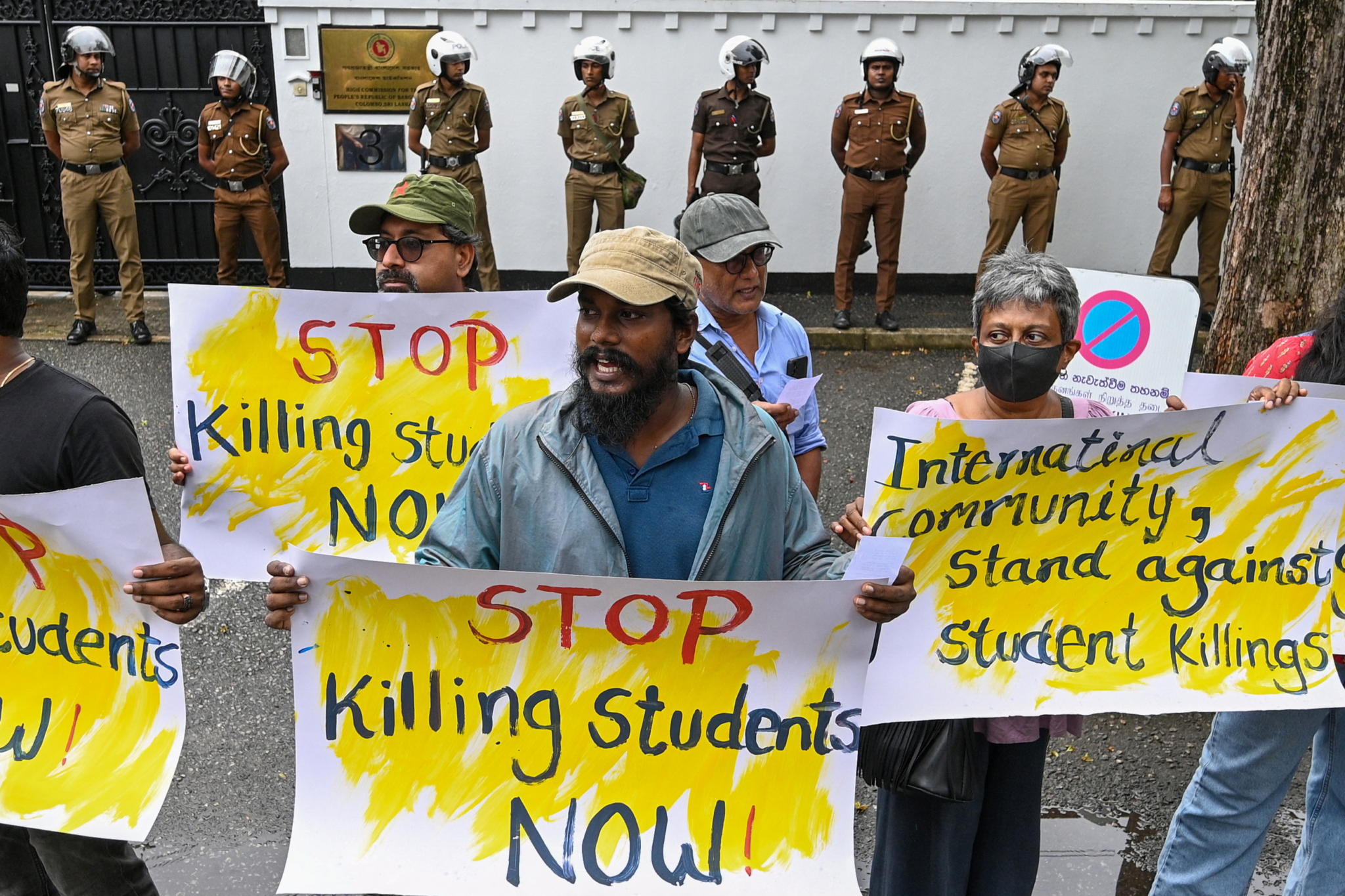In a world with increasing inequality and persisting discrimination, armed conflict, authoritarianism and crises of governance, as well as mounting global threats on livelihoods and the planet, protests are widespread and on the rise.
Protest and Progress
Throughout history, protests have enabled individuals and groups to express dissent, opinions and ideas, expose injustice and abuse, and demand accountability from those in power. With collective mobilization, creativity and defiance, people who protest are a thorn in the side of the powerful. Helping to shake up rigid and unaccountable power dynamics and structures, protesting has been a vehicle for advancing human rights.
Instead of addressing pressing concerns and promoting dialogue to find solutions to injustice, abuses and discrimination, states often respond by stigmatizing and cracking down on peaceful protesters. In all regions of the world, Amnesty International has documented a wide array of undue restrictions on protest in ordinary and emergency legislation, criminalization of protesters, and the unlawful use of force to disperse protesters and to intimidate and deter others from joining these mobilizations. This is why we launched Protect The Protest.
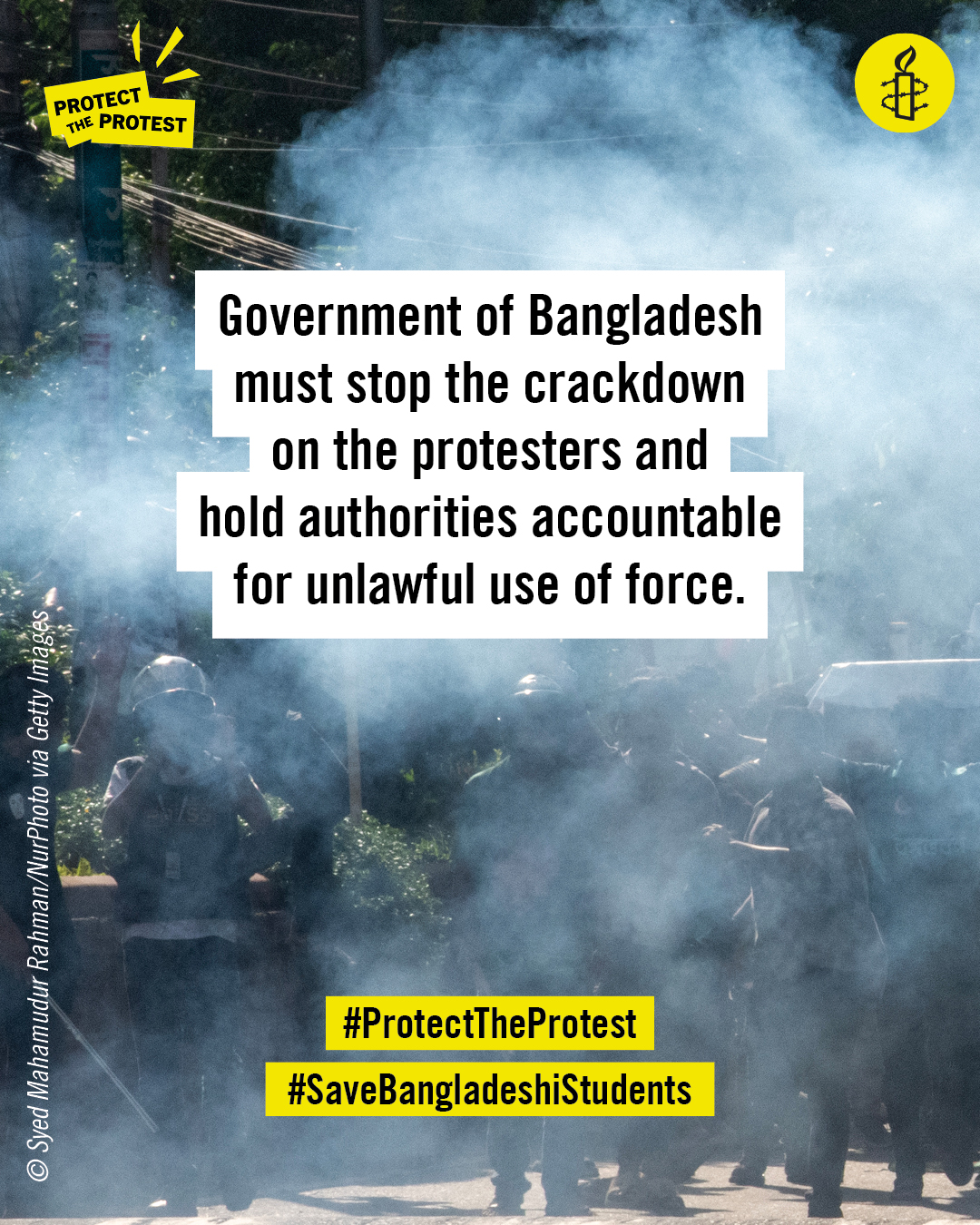
Protect the Protest in Bangladesh
Bangladesh is witnessing the deadliest crackdown against protesters in the country’s post-independence history.
On July 1, 2024, university students launched protests to demand reforms in the existing quota-system which reserves 30% of government jobs for descendants of independence war veterans claiming that it unjustly favours supporters of the ruling party. The deadly crackdown that followed has killed hundreds, including journalists and bystanders. Thousands more have been injured and some 10,000 arrested. The Bangladeshi authorities have shown complete disregard for the right to life, and an abject failure to comply with their human rights obligations under domestic and international law.
Amnesty’s Citizen Evidence Lab verified video and photographic evidence of both unnecessary force and excessive force being used against protesters by law enforcement officials. Security forces deployed less lethal weapons, including tear gas and rubber bullets, and lethal ammunition such as bird shot at unarmed protesters.
A “shoot on sight” curfew imposed on Saturday, July 20, 2024, grants powers to security forces to use lethal force in situations where it cannot be justified. Nationwide internet bans are negatively impacting peoples’ safety, security, and livelihoods, while also causing panic and instability.
Show your solidarity
Reply to social media posts, video on protest in Bangladesh with an emoji, a picture, or a drawing of a candle, or a flower with the hashtags #SaveBangladeshiStudents and #ProtectTheProtest
Connect with campus groups, especially Bangladeshi student groups, to organize solidarity and awareness events.
What else you can do
Read and share Amnesty’s analysis What is happening at the quota-reform protests in Bangladesh?
Write letters to the Government of Bangladesh calling the release of all those detained solely for peaceful protest. More information and addresses for letters can be found here.
#ProtectTheProtest
BANGLADESH IS WITNESSING THE DEADLIEST CRACKDOWN AGAINST PROTESTERS IN THE COUNTRY’S POST-INDEPENDENCE HISTORY.
Call on the government of Bangladesh to uphold human rights and end this repression.
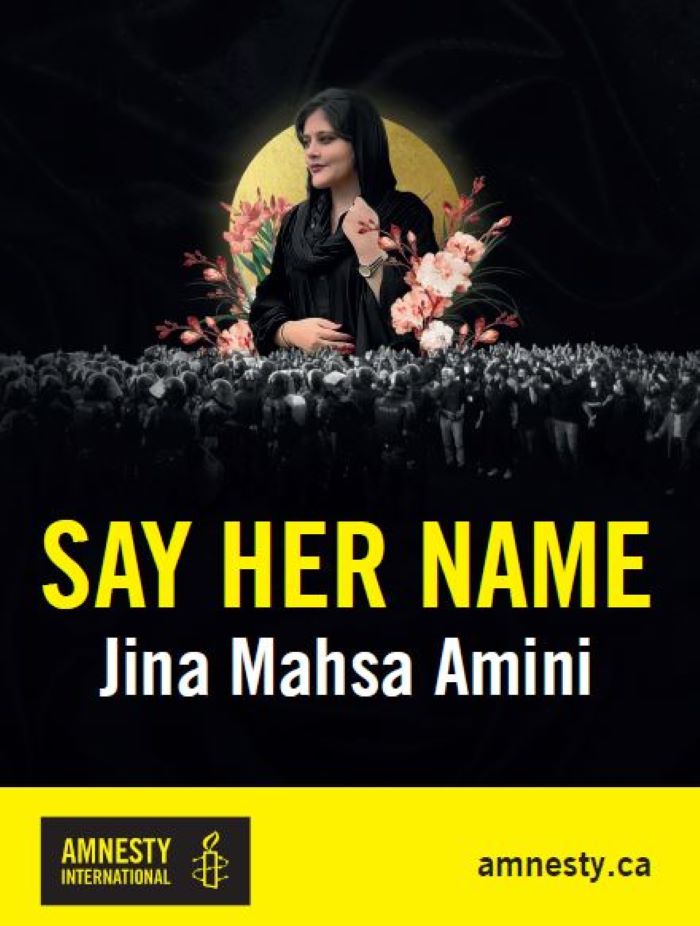
Protect the Protest in Iran
The death in detention of 22-year-old Jina Mahsa Amini on September 16, 2022, following her violent arrest by Iran’s “morality” police sparked an unprecedented popular uprising. The crackdown was swift and brutal: hundreds of protesters were killed, thousands injured, and over 20,000 arrested. The first protesters were executed in December 2022 after fast-tracked trials and forced confessions.
As women and girls led the call for change in Iran, challenging decades of gender-based discrimination and violence, they became targets for arrest and retaliation. Nearly two years later, Iran is doubling down on enforcement of discriminatory and degrading compulsory veiling laws that severely impact the human rights of women and girls and place them under mass surveillance.
Iranian authorities are desperately trying to reassert their dominance and power over those who dared to stand up against decades of oppression and inequality during the ‘Woman. Life. Freedom.’ uprising. The past year has seen a surge in executions and use of the death penalty as a tool of political repression. Instead of opening criminal investigations into unlawful killings during protests, Iranian authorities have destroyed evidence and persecuted survivors and victims’ relatives who called out for truth, justice, and reparation.
Featured case: Toomaj Salehi
Dissident rapper Toomaj Salehi is arbitrarily detained in Esfahan central prison, Esfahan province, because of his peaceful activism, including participation in the “Woman Life Freedom” uprising and social media posts critical of the Iranian authorities.
Toomaj Salehi was arrested in October 2022 and subjected to enforced disappearance for a month. During that time, his forced “confessions” were aired on state television. After a rapid and grossly unfair trial in July 2023, Toomaj was sentenced to six years and three months. On November 18, 2023, after he was released on bail, he posted a video online describing how he was tortured during arrest, including repeated beatings, resulting in fractures in his hands and leg, and loss of consciousness for two days. He was also subjected to prolonged solitary confinement for eight to nine months. He was re-arrested on November 30, 2023, and sentenced to death in April 2024 after another grossly unfair trial.
In June 2024, following international campaigning by Amnesty and others, the Supreme Court overturned Toomaj’s conviction and death sentence, and sent the case to a lower court. He is now facing new spurious charges in separate proceedings solely for peacefully exercising of human rights, including freedom of expression through his music. The authorities continue to deny him access to adequate healthcare, including for his torture-related injuries in his leg and hands, for which he needs surgery and pain relief.
Amnesty International is calling on Iranian authorities to immediate and unconditionally release Toomaj Salehi and drop all charges against him related to exercising his right to freedom of expression and peaceful assembly. Pending his release, they should provide Toomaj Salehi with adequate healthcare and regular visits with his family and lawyers, and protect him from further torture and other ill-treatment. A prompt, independent, effective and impartial investigations into his torture allegations must be conducted, with those suspected of criminal responsibility brought to justice in fair trials.
Write to:
Head of judiciary, Gholamhossein Mohseni Ejei
c/o Embassy of Iran to the European Union
Avenue Franklin Roosevelt No. 15
1050 Bruxelles
Belgium
More information and addresses for letters can be found here.
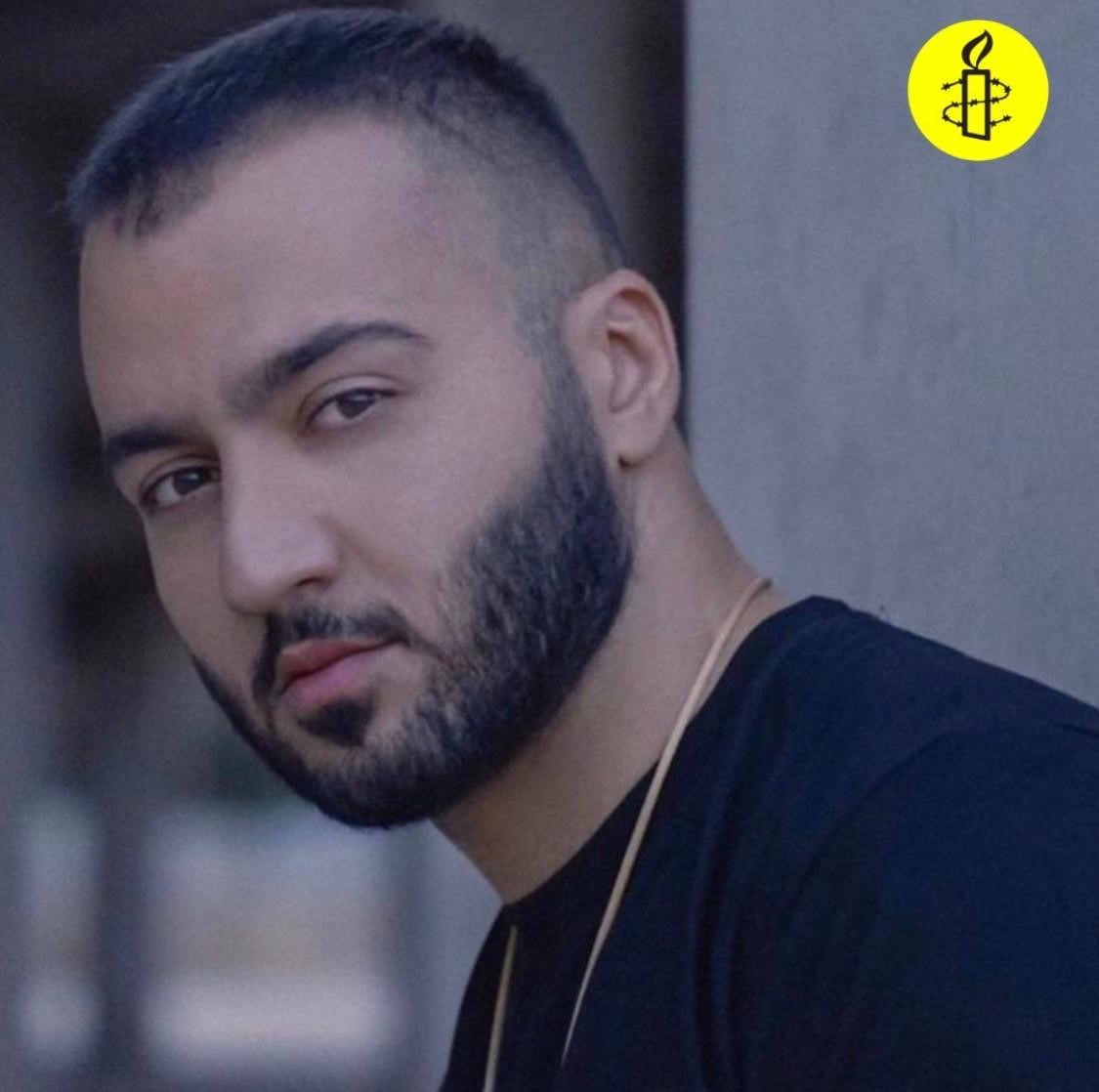
Thousands at risk of execution.
Since the Woman Life Freedom uprising, Iranian authorities have doubled down on their brutal use of the death penalty.
Urge the international community to press Iran establish an official moratorium on executions with a view to fully abolishing the death penalty.
Show your Solidarity in September
Watch for and support vigils and rallies organized by the Iranian community in Canada in your area on or around September 16. You’ll see and hear many different messages from the groups in attendance. Bring your own messages of solidarity, calls for human rights and to protect the protest in Iran. Here are some sample phrases:
Say her name: Mahsa Amini
Women Life Freedom
Protect the Protest in Iran
Stop the execution spree in Iran
Forced Veiling Violates Human Rights
Stop Forced Veiling
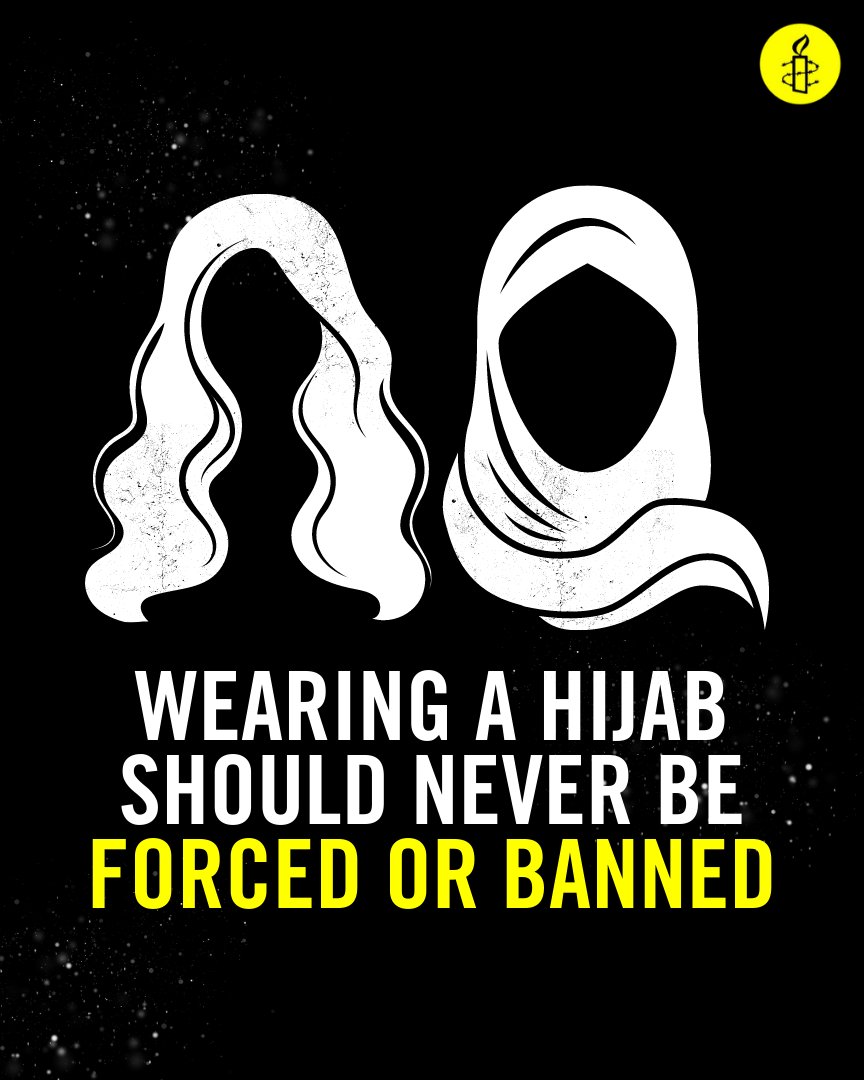
Questions? Want to get more involved?
For more information, please contact Hilary Homes, Crisis and Tactical Campaigner, at the national office: hhomes@amnesty.ca.
Header image: Activists demonstrate in front of the Bangladesh High Commission (embassy) in the capital Colombo on July 22, 2024, demanding an end to a government crackdown against protesters opposing a controversial job allocation quota system. Photo by Ishara S. KODIKARA / AFP via Getty Images.












